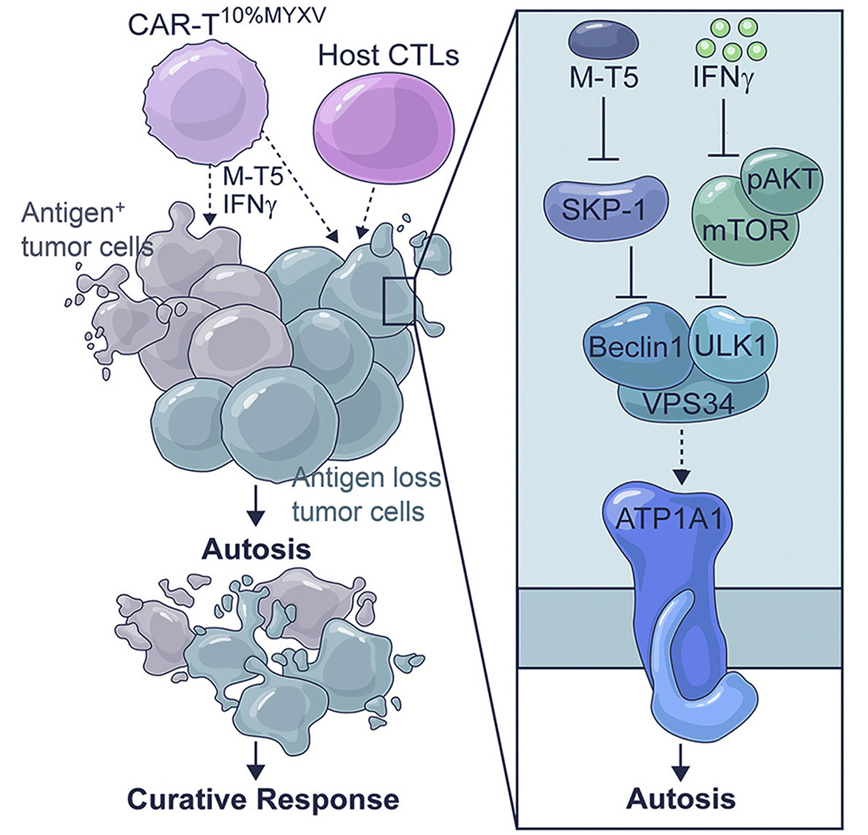The immune system has evolved to protect the body from a variety of potential threats. These threats include bacterial diseases, such as plague, cholera, diphtheria, and Lyme disease, and viral infectious diseases, such as influenza, Ebola, and SARS-CoV-2.
Despite the impressive strength of the immune system’s complex defenses, one threat is particularly difficult to counter. It occurs when the body’s own cells go bad causing cancer to develop. Although the immune system is often involved in trying to rid the body of malignant cells, its efforts are often thwarted as the disease progresses.
In a new study, researchers from Arizona State University and Wake Forest University School of Medicine, among others, used the myxoma virus to combine immunotherapy and viral therapy to provide patients with difficult-to-treat cancer. new Hope. Related research results were published in the journal Cancer Cell on September 12, 2022, with the title “Induction of tumor cell autosis by myxoma virus-infected CAR-T and TCR-T cells to overcome primary and acquired resistance”. The corresponding authors of the paper are Grant McFadden of Arizona State University and Yong Lu of Wake Forest University School of Medicine.
The approach involves a combination of two approaches, both of which have shown considerable success in some cancers. The study describes how oncolytic virotherapy, a technique that uses an anti-cancer virus, works synergistically with existing immunotherapy techniques to boost immunity and effectively target and destroy cancer cells.
Oncolytic viruses represent an exciting new avenue for cancer therapy. Such viruses have the extraordinary ability to hunt and destroy cancer cells while leaving healthy cells unharmed, and also enhance the ability of the immune system to recognize and destroy cancer cells. An oncolytic virus called myxoma virus was the focus of the new study. The new study shows that using T cells infected with myxoma virus can induce a previously unobserved form of cancer cell death. This form of cell death, known as “autosis,” may be particularly useful in solid tumors that have proven resistant to various forms of cancer treatment (immunotherapy alone).
“This study demonstrates the enormous potential of combining viral therapy with cell therapy to treat cancers that are currently incurable,” McFadden said.
Internal Sentinel
The immune system consists of a series of specialized cells designed to patrol the body and respond to threats. The immune system is involved in an endless arms race with pathogens, which have evolved sophisticated techniques to try to evade immune defenses, multiply in the body and cause disease. Cancer presents unique challenges to the immune system because tumor cells often lack the features that recognize them, making it impossible for the immune system to attack them by distinguishing between self and non-self.
Cancer cells can use a range of avoidance strategies to further shorten the immune system’s efforts to hunt down and destroy them. Scientists hope to help the immune system overcome cancer’s notorious camouflage tactics by developing a new class of experimental techniques known as adoptive cell therapy (ACT).
Such approaches typically involve taking out populations of cancer-fighting white blood cells called T cells, reprogramming their search-and-destroying abilities, and then reinfusing them into patients. The new study describes two forms of ACT immunotherapy: CAR T-cell therapy (CAR-T) and T-cell receptor (TCR) T-cell therapy (TCR-T). The basic idea of every ACT immunotherapy is the same: using activated T cells extracted from patients to treat cancer.
New method delivers double whammy to tumor cells
The development of these treatments has been a revolution, with some cancer patients facing grim prospects achieving remarkable recoveries with immunotherapy. But technologies like CAR-T cell therapy and TCR-T cell therapy have their limitations and are often ineffective against advanced solid tumors. In these cases, cancer cells often manage to evade T cell destruction by downregulating or losing surface antigens or MHC proteins that T cells use to recognize them.
The new study highlights the ability of immunotherapy to break through cancer resistance when combined with viral therapy, particularly using CAR-T cells, or TCR-T cells, infected with myxoma virus. Myxoma virus can directly target and kill cancer cells, but more usefully can induce an unusual form of T cell-directed cell death, known as suicide. This form of cell death enhances two other forms of programmed cancer cell death induced by T cells, apoptosis and pyroptosis.
During myxoma virus-mediated suicide, other cancer cells near the cancer cell targeted by the therapy are also destroyed in a process known as bystander killing. This effect could significantly enhance the aggressive eradication effect of this dual therapy on cancer cells, even in notoriously difficult-to-treat solid tumors.
Therefore, this combination of myxoma virus and immunotherapy has the potential to turn “cold tumors” that cannot be detected by the immune system into “hot tumors” that immune cells can recognize and destroy, allowing CAR-T cells or TCR- T cells enter the tumor environment, proliferate and activate.
“We are at the forefront of discovering new applications for myxoma virus and oncolytic virus therapy,” said paper co-author Masmudur Rahman of Arizona State University. “In addition, these findings provide a new basis for testing cancer-killing viruses with other cell-based cancers that can be used in cancer patients. Immunotherapy opens the door.”
Fundamentally redesigning oncolytic viruses like myxoma virus to target a range of refractory cancers offers a new avenue for treating these devastating diseases.
References:
Ningbo Zheng et al. Induction of tumor cell autosis by myxoma virus-infected CAR-T and TCR-T cells to overcome primary and acquired resistance. Cancer Cell, 2022, doi:10.1016/j.ccell.2022.08.001.









